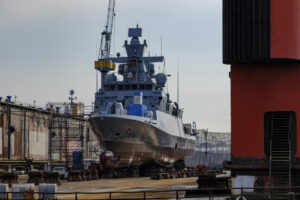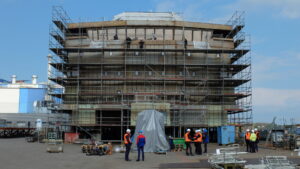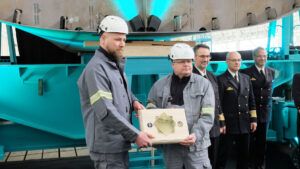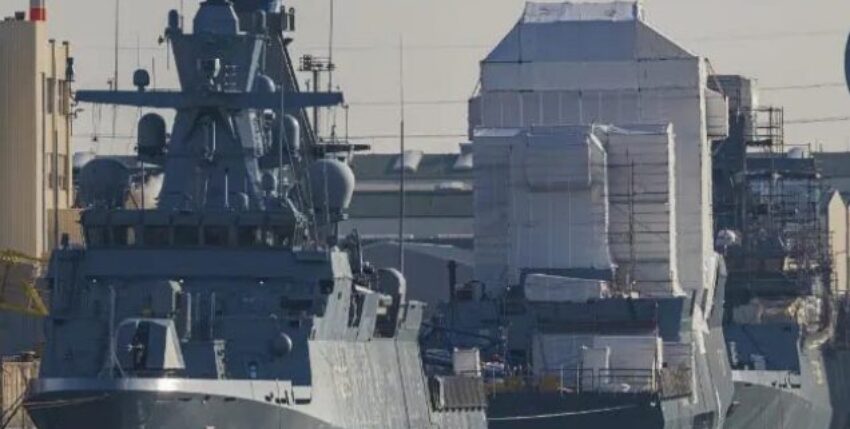In future, the Lürssen Group will concentrate exclusively on the construction of mega yachts
It had already been an issue on the coast for weeks. It is therefore not surprising that this decision has been made. The timing on a Monday morning in September 2025 is also not necessarily sensational, as the market for naval shipbuilding is currently very dynamic and urgent. Negotiations have been going on since August. The pressure to become more powerful industrially in Germany has existed for three years due to the explosive security policy situation. Whether the culture of a Düsseldorf-based company focussing on a land-based portfolio can be reconciled with the way of thinking on the coast is not just an arabesque. The well-known fact that the succession issue of the Lürssen families played a not insignificant role in the spin-off is actually gossip, but a long-awaited consequence.
What actually happened?

In 2021, Fr. Lürssen Werft GmbH & Co. KG, based in Bremen Vegesack, separated from the Defence division and founded NVL B.V. & Co. KG, initially in the same building in Vegesack. Since then, NVL has owned Blohm+Voss in Hamburg, the Peene shipyard in Wolgast, the Neue Jadewerft shipyard in Wilhelmshaven and the Norderwerft shipyard in Hamburg as well as other foreign locations in Australia, Bulgaria and Croatia. NVL has immense potential in naval shipbuilding; with the exception of submarines, it can repair and build pretty much anything that the navy and authorities want and that is in demand abroad. As a repair yard owner, NVL is an important partner of the German Navy. With a current order volume of over 7 billion euros, corvettes, fuel supply vessels and fleet service boats are being built, a design for new tenders is in the drawer and the joint venture with Kraken Technology Group in the UK is looking to a new weapons and reconnaissance future. Whether Damen Shipyards Group will remain in the running as a subcontractor for the Class 126 frigate for the German Navy - and whether it will be built at all - is an exciting prospect in the near future.
Sale of the division and retention of expertise
As the company announced today, Rheinmetall plans to take over all NVL sites and employees and to integrate and further develop them, together with their current management, as a separate division within the Rheinmetall Group. This cannot be otherwise, as Rheinmetall has no shipbuilders or engineers with a maritime focus in its ranks, not to mention the skilled labour. The sale is still subject to approval by the competition authorities. This consolidation is commercially necessary and timely in terms of security policy. Friedrich Lürßen, Managing Partner, commented: "We believe that consolidation within the defence industry is necessary and sensible, particularly in view of the intensified threat situation. This is the only way to ensure our country's ability to defend itself quickly. With the sale of NVL to Rheinmetall, we are now creating the conditions for a powerful defence champion with broad-based systems expertise. We are delighted to have found in Rheinmetall a trustworthy and strong partner who can secure a successful future for NVL and its employees." His cousin Peter Lürßen, also Managing Partner of Lürssen Maritime Beteiligungen GmbH & Co KG, adds: "The talks in recent weeks have shown that the chemistry between our companies is right and that we have similar values. It is important to us to place our marine division, our technological expertise and, above all, the approximately 2,100 employees of NVL in good and reliable hands." This is not only a political responsibility, but also a commercial and entrepreneurial necessity: the consolidation of legacy assets is urgently required, as the various shipyard locations of the NVL Group are differently equipped for a different security policy situation in the future. You also need a large, good investor to secure the investments of the future.
Naval shipbuilding becomes more complex

In the past, shipyards built warships and bought weapons and systems for them, installed them and built on them. The shipyard set the pace and placed the order, the others were just the suppliers. Things are different today: you have to think systemically, right from the first weld seam. The complexity of command and control and weapon systems has changed considerably and networking and interconnection are the guiding principles. Added to this are unmanned and autonomous units in the air, on the water and underwater. The integration of weapon systems sets the pace and unfortunately also the completion dates, as can be seen in the example of the Class 130 corvettes - and not only there and not only at NVL. Rheinmetall's naval division, which is now to be established, is coming up against a company that is currently the most important supplier of defence technology and has hardly made a maritime appearance to date, apart from the development of simulators for the navy and ammunition. This is one of the many synergetic opportunities to dovetail expertise in weapons and ammunition systems with naval shipbuilding. In addition, NVL has many properties and industrial sites with already established production factors from which Rheinmetall can benefit. It is conceivable that vehicles could also be manufactured in an unused shipyard hall.
Takeover as early as 2026

The two companies are aiming to complete the takeover by the beginning of 2026. No information about the purchase price was released to the outside world; the parties have agreed not to disclose it. "Rheinmetall will be a relevant player on land, at sea, in the air and in space," explained CEO Armin Papperger. Rheinmetall is thus developing into a "cross-domain systems house". Rheinmetall wants to meet the massively increasing requirements of the naval forces and the rising budgets for procurement "with high-performance system solutions" - such as "naval missiles and launchers, main and secondary guns for the navy, missile defence, sensors and other electronics", said Papperger. But the takeover also needs to be financed, and Rheinmetall is negotiating with investors including One Equity and Mutares. This was reported by the Handelsblatt.
Lürssen now "only" builds yachts
In future, the Lürssen Group will concentrate exclusively on the construction and repair of mega yachts. Until now, as a specialist shipbuilder, the company has been good at providing technological support to each other in a crossover technology between its Defence and Yacht expertise. A mega yacht is also a specialised ship and the customers, whether naval or billionaire, have special requirements and are demanding. Both want the best and the latest. It remains to be seen how this cross-fertilisation will work out.
National champion?
This does not answer the question that has been discussed for years as to whether Germany will now have a leading national naval shipbuilder like France, Spain or Italy. There are still important shipbuilders and high-tech shipyards with a future on the Kiel Fjord and the Lower Weser, which are taking note of today with suspicion, but also calmly. Competition still stimulates business. TKMS also needs an investor, but Rheinmetall is unlikely to be one - this opportunity was missed by the last government. We will soon find out who comes into question - it remains exciting.








One Response
The announcement of the takeover of Lürssen's naval division NVL by Rheinmetall represents a new chapter for the German defence industry and shipyards in particular. This strategic step goes beyond the usual consolidation of the industry and could herald the establishment of a kind of federal system house for the navy. As a result, the vision formulated by CEO Armin Papperger of positioning Rheinmetall as a cross-domain player on land, at sea and in the air is being realised.
The synergies are obvious. Rheinmetall's in-depth expertise in the areas of weapon systems, ammunition, sensor technology and networking meets the established ability to build highly complex naval vessels, as represented by NVL alongside its equally important competitor TKMS. Where previously the shipyard acted as a general contractor and integrated systems from external providers, a player is now emerging that can potentially deliver significantly more from a single source. This could be a great opportunity for the German Navy: faster processes, deeper system integration and hopefully greater fleet availability.
But with new power comes new responsibility. The success of this takeover will not be measured by the size of the merged company or the synergy effects on the balance sheet, but by the capabilities it makes available to the Bundeswehr. Current projects such as the fuel suppliers or the fleet service boats are important, but due to the long project duration they represent the requirements of today and perhaps tomorrow rather than the day after tomorrow. The true test for the new organisation lies in the future.
And it is becoming clear that the future of naval warfare lies more with unmanned and networked units than with the traditionally named ones. While the "Future Combat Surface System" (FCSS) is already in the starting blocks, for which Opex trials have been running since Monday (15/09/25), the strategic focus after the F127 is on the next but one major project: the Large Remote Missile Vessels (LRMV). As mobile, long-range missile platforms, these unmanned or optionally manned vessels are intended to further strengthen the striking power of the manned F127 (Air Defence & Maritime Strike). They are not a "nice-to-have", but could be the long-term carrier for deterrence and defence in the alliance.
This is precisely where the proactive and somewhat provocative question is posed directly to the architect of this new star: Mr Papperger, the creation of this connection is an impressive first step. But the navy doesn't need any more paper tigers, it needs ships and capabilities. Hence the question: when are you planning to submit the design for the pioneering Large Remote Missile Vessels (LRMV) and when can we expect the first unit to start firing?
The answer to this question may show whether the takeover of NVL really is the starting signal for a new era or chapter in German naval shipbuilding or whether a champion has just been created on paper. Time is pressing and the navy must prepare for the storm from the east, both today (Fight tonight) and tomorrow (Fight tomorrow).